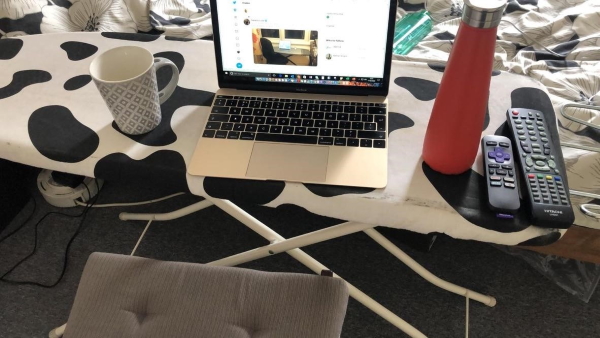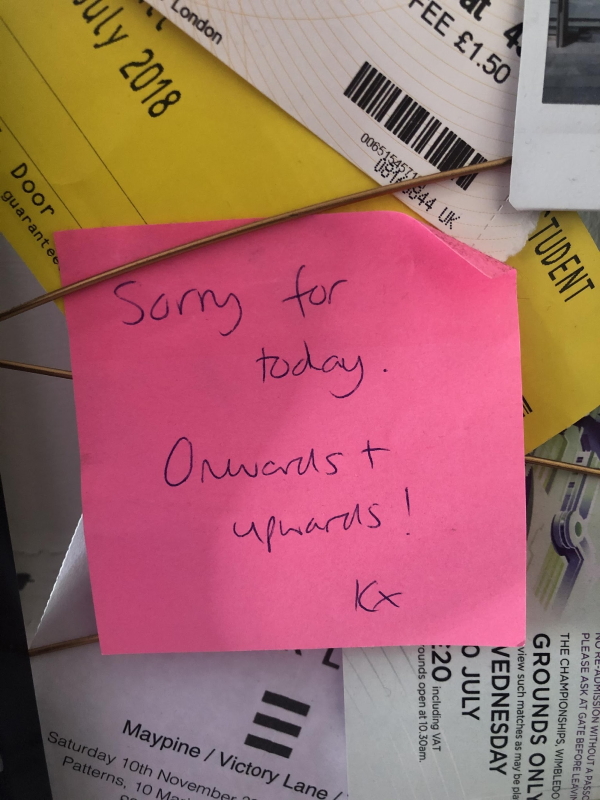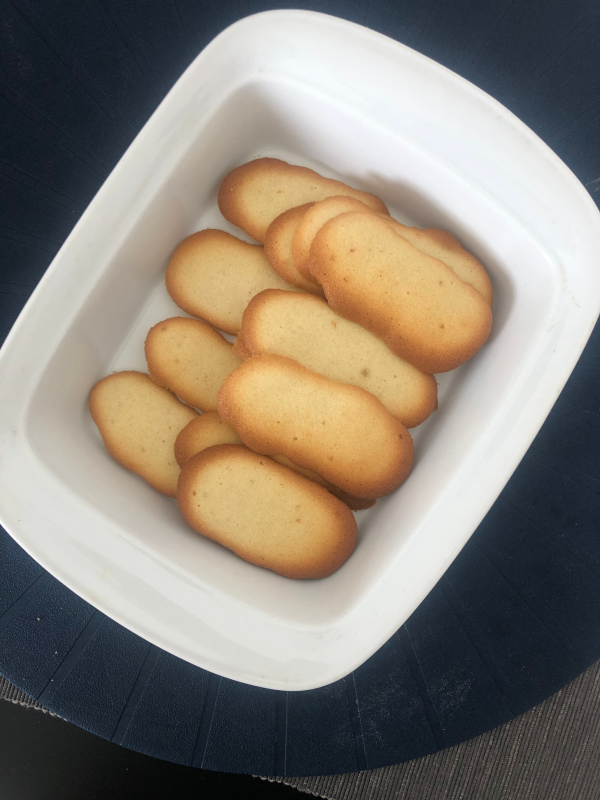We’ve asked our #DataImpactFellows to write a post on the theme of ‘change’.
 Anne Alarilla shares an open and personal reflection of change in a time of pandemic.
Anne Alarilla shares an open and personal reflection of change in a time of pandemic.
At the end of last year, I left my job at Cancer Research UK (CRUK) and started a new role as an insight analyst for NHS Blood and Transplant. During this time, I was under the impression that this would be the biggest change of my year but whilst I was still settling in, a bigger and more rapid change is now happening to all of us.
Now, I am working from home on my makeshift ironing board desk, trying to be productive, whilst simultaneously feeling constantly tired and unfulfilled with any progress that I make with my work and always on the verge of worry and numbness about my personal life.
Image: Anne’s makeshift ironing board desk
I see two parts of the spectrum with friends and family getting furloughed but also some working as critical front-line staff. As I work for the NHS, we are operating with a heavy focus on how we can use our resources to react towards this pandemic. As a result, some of my work has lost its importance in terms of impact.
This is a whole new layer of imposter syndrome for me. Navigating with a sense of urgency but also trying to work “normally”.
As such, mental health has been a more prominent topic for me, finding motivation, coping strategies and new ways to work is more important than ever before. As I am an analyst at heart, I turn to evidence-based strategies to help me attend to my mental health and here I’ll share some tips on how I’ve coped.
“Be master of mind rather than mastered by mind.”
Zen proverb
One of the things that I have learned whilst doing psychology is the power of the mind, most specifically your cognitions. Impact and productivity are something I learned to be prideful of in terms of my work. Therefore, having this new arrangement of working has really affected my work outputs and consequently the pride in what I do.
I frequently peruse twitter where I see other professionals across different fields, sharing their own experiences with this crisis.
One piece of advice that really stuck with me is that “you are not working from home; you are at home trying to work”.
Practising this cognitive restructuring allowed me to be kinder to myself, particularly with work. I have accepted that perhaps I won’t always feel productive at this time and to celebrate every progress I make albeit in small increments. We are fighting years of conditioning that being at home means relaxing, so give yourself time to adjust.
“Sorry for today, onwards and upwards”
Constantly being at home, our days sort of becomes one and it’s hard to separate or even remember what you did yesterday. Again, this is probably linked to not feeling productive and impactful so there are no big milestones to recall.
But this quote is on a post-it note in my room and it is from my old manager in CRUK.
It’s not related to anything to do with right now, but it is a great reminder that if you do have a bad day today, you can always try again tomorrow. Just keep being hopeful and some days won’t feel so bad.
So, I suppose my next tip is the power of positivity. Positive thinking has been shown to be effective at reducing stress and increased physical well-being. This is not related to ignoring the bad things that are happening to you or around you, but rather staying hopeful that it will get better.
“So much time and effort is spent on wanting to change, trying to change, to be somebody different, better, or new. Why not use this time to get comfortable with yourself as you are instead?”
Andy Puddicombe, Headspace co-founder
The paradox of change, change within our control is powerful but change put upon us is intimidating.
One thing that I recently started doing is meditating through the help of Headspace. I’ve never really been one to meditate but I recognised that I was finding it extremely hard to cope and relax during this time and someone suggested meditation to me.
Meditating allowed me to accept things for what they are and focus on the now, even if it’s good or bad.
It also forced me to focus on my being, things that will always be constant for me and things I can control such as my breathing. Ultimately, meditation helped because it gave me a set time to focus on myself and to just relax.
Right now, the boundaries of time are blurrier and carving time out to relax is essential. Allowing yourself to be immersed by an activity at this present time.
Other ways I relaxed are through exercising, baking, watching Netflix all day or playing animal crossing (yes, I know very typical).
Image: Lengua de gato- Filipino butter cookies
The disproportionately high rate of BAME individuals among those who have died
Data is power and sometimes reveals more than what you are ready for.
In this analysis by the HSJ, the findings show that BAME staff account for a higher proportion of deaths within the same role. I know that there is a high proportion of BAME staff working for the NHS, so, it is not surprising that they would be accounting for a higher proportion of deaths. However, treating this to be acceptable is unethical.
I am a second-generation immigrant; I was born in the Philippines and my parents along with other members of my extended family are health care professionals who immigrated to England for a better life. My family and a lot of my friends are front line staff therefore this fight against coronavirus is more personal to me. I am a proud Filipina and a proud immigrant, but I’ve never fully shared my experiences regarding this side of my identity.
However, as part of attending to my mental health, one of the things that has helped me is participating in meaningful actions. Being a Data Impact Fellow and frequently submitting blog posts has allowed me to have the space and confidence to share my ideas, thoughts and experiences and one of the ways I can engage in meaningful actions.
From my dad’s experience, I know that he doesn’t speak English fluently and sometimes dealing with individuals who believe that speaking English fluently is a sign of effective communication, therefore communicating his struggles and frustrations particularly with the system is not always successful. Furthermore, having to navigate all the different ways to access help is a minefield.
Additionally, I also think the difference in culture means that individuals from the BAME background are more susceptible to the risk. From my dad, I know that he has this mentality to work hard first, before thinking about himself. He is working for his family and a better life.
Also, after reading up on other BAME health workers experiences, I noticed that the call of duty and sense of responsibility for them resonates deep within our cultures so much so that it can put them in risky situations.
We need to make it easier for BAME individuals to communicate their ideas and we need to work harder to understand different communication styles.
We need to value diversity and destroy the assumption that “equality” means exactly the same. It is unethical to assume that this way of working works and should continue.
This pandemic has highlighted systemic problems and that change to address these systemic problems should continue, particularly when we return to our “new normal”. I am by no means saying that this is the truth for everyone, indeed, my intentions are merely to share my own experiences in the hopes that other people can identify or feel represented.
On a final note, regardless of ethnicity or gender or religion, I will forever be thankful and I am truly in awe with the people of the NHS and all the other frontline staff and key workers who are risking their safety during this pandemic.
There are many things that we can be thankful for and just appreciating the little things will go a long way (even if you physically can’t right now).
About the author
Anne Alarilla is one of the UK Data Service Data Impact Fellows 2019 and an Insight Analyst for the Insight, Strategy and Innovation team at NHS Blood and Transplant.
The main role of her team is to be the voice of the donor/patients and improve their experience through data analysis and research. She also has a specific project working closely with the people directorate and evaluating staff’s experience and attitude towards NHSBT, particularly among the Black Asian and Minority Ethnic (BAME) groups. The aim of her project is to increase staff recruitment in BAME groups which will hopefully increase more BAME donors. She will also be exploring how she can use the available data in the UK Data Service to assist her project.
Anne previously worked at Cancer Research UK where she explored smoking, overweight and obesity prevalence in the UK and individual nations of the UK with a particular focus on prevalence trends. She also created a tool to accumulate smoking, overweight and obesity prevalence statistics from individual nations’ health surveys in one central place.
Follow Anne on Twitter: @alarillaanne



